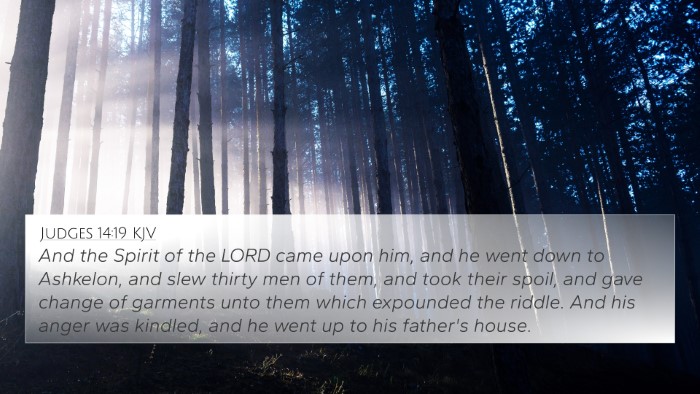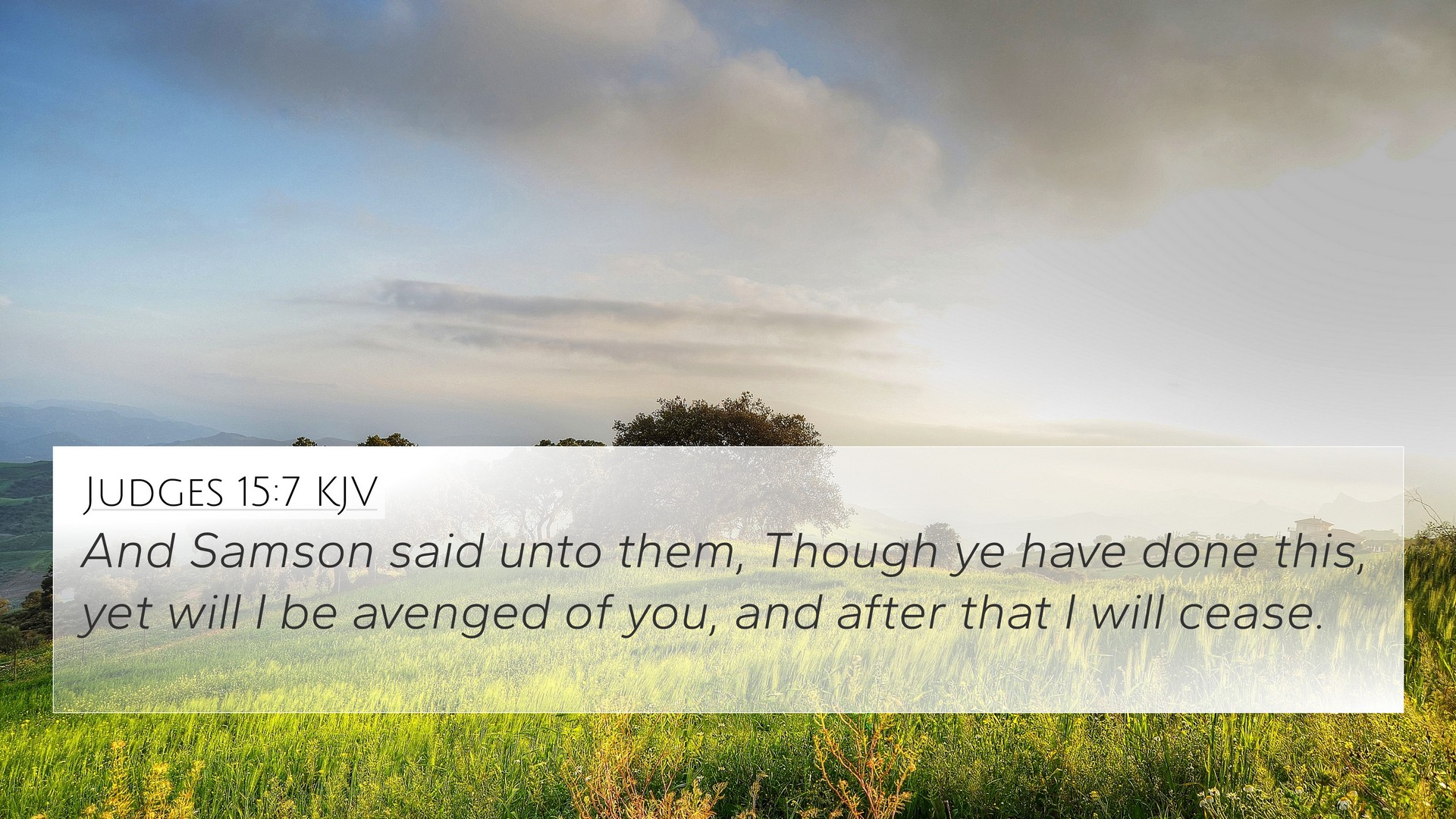Old Testament
Genesis Exodus Leviticus Numbers Deuteronomy Joshua Judges Ruth 1 Samuel 2 Samuel 1 Kings 2 Kings 1 Chronicles 2 Chronicles Ezra Nehemiah Esther Job Psalms Proverbs Ecclesiastes Song of Solomon Isaiah Jeremiah Lamentations Ezekiel Daniel Hosea Joel Amos Obadiah Jonah Micah Nahum Habakkuk Zephaniah Haggai Zechariah MalachiJudges 15:7 Similar Verses
Judges 15:7 Cross References
And Samson said unto them, Though ye have done this, yet will I be avenged of you, and after that I will cease.
Uncover the Rich Themes and Topics of This Bible Verse
Listed below are the Bible themes associated with Judges 15:7. We invite you to explore each theme to gain deeper insights into the Scriptures.
Judges 15:7 Cross Reference Verses
This section features a detailed cross-reference designed to enrich your understanding of the Scriptures. Below, you will find carefully selected verses that echo the themes and teachings related to Judges 15:7 KJV. Click on any image to explore detailed analyses of related Bible verses and uncover deeper theological insights.

Judges 14:19 (KJV) »
And the Spirit of the LORD came upon him, and he went down to Ashkelon, and slew thirty men of them, and took their spoil, and gave change of garments unto them which expounded the riddle. And his anger was kindled, and he went up to his father's house.

Judges 14:4 (KJV) »
But his father and his mother knew not that it was of the LORD, that he sought an occasion against the Philistines: for at that time the Philistines had dominion over Israel.

Romans 12:19 (KJV) »
Dearly beloved, avenge not yourselves, but rather give place unto wrath: for it is written, Vengeance is mine; I will repay, saith the Lord.
Judges 15:7 Verse Analysis and Similar Verses
Understanding Judges 15:7
Judges 15:7 states, "And Samson said to them, 'Though you have done this, yet will I be avenged of you, and after that I will cease.'" This verse captures a critical moment in the narrative of Samson, a judge of Israel known for his immense strength and complex character.
Interpretation and Commentary
This passage reflects Samson's intense feelings of betrayal and desire for retribution. As noted in Matthew Henry's Commentary, Samson is portrayed as a figure fueled by personal vengeance rather than a divinely appointed instrument of justice. His focus on revenge, rather than mercy or reconciliation, reveals the darker aspects of his character.
Albert Barnes emphasizes that this declaration of vengeance signifies a turning point in Samson's story. It underscores the idea that his motivations are not aligned with God's will, reflecting a restless spirit that seeks personal satisfaction through conflict and violence.
Adam Clarke further elaborates on the implications of Samson's words, suggesting that his quest for vengeance leads to a cycle of violence. Rather than being a heroic figure, Samson’s thirst for retribution aligns him more closely with the flawed human nature, which often seeks to respond to wrongs with further wrongdoings.
Cross References and Thematic Connections
To enrich our understanding of Judges 15:7, we can examine several cross-references that highlight similar themes of vengeance and justice. Here are 10 Bible verses that relate closely to Samson’s declaration:
- Proverbs 20:22: "Do not say, 'I will repay evil'; wait for the Lord, and he will deliver you."
- Romans 12:19: "Beloved, never avenge yourselves, but leave it to the wrath of God, for it is written, 'Vengeance is mine, I will repay, says the Lord.'
- Genesis 24:42: The importance of seeking divine guidance in moments of conflict.
- 2 Corinthians 10:3: "For though we walk in the flesh, we are not waging war according to the flesh."
- Galatians 6:7: "Do not be deceived: God is not mocked, for whatever one sows, that will he also reap."
- Matthew 5:39: "But I say to you, Do not resist the one who is evil. But if anyone slaps you on the right cheek, turn to him the other also."
- Romans 12:21: "Do not be overcome by evil, but overcome evil with good."
- Luke 18:7: "And will not God give justice to his elect, who cry to him day and night?"
- James 1:20: "For the anger of man does not produce the righteousness of God."
- Exodus 20:13: "You shall not murder," highlighting the moral implications of vengeance.
Thematic Bible Verse Connections
When we analyze Judges 15:7 in the context of these cross-references, the themes of divine justice versus personal vengeance emerge prominently. The verse serves as a reminder of the human tendency to retaliate against wrongdoings, contrasted with the call to trust in God's timing and His ultimate justice. The connections between these scriptures illustrate the broader biblical narrative that advocates for forgiveness and reliance on divine intervention.
Scriptural Cross-Referencing aids in understanding the recurring themes of justice, retribution, and divine authority throughout the Bible. By examining how various passages inform each other, one can gain deeper insight into the moral and theological implications of texts such as Judges 15:7.
Tools for Bible Cross-Referencing
To explore cross-references for deeper understanding, consider using tools such as:
- Bible concordance
- Bible cross-reference guide
- Cross-reference Bible study materials
- Bible chain references
- Comprehensive Bible cross-reference system
Conclusion
Judges 15:7 offers profound insight into the complex nature of human emotions in the face of betrayal and injustice. It invites readers to reflect on the implications of seeking vengeance rather than relying on God's justice. By engaging with related verses and thematic connections, one can appreciate the scriptural narrative that encourages forgiveness and the avoidance of personal vendettas.
This understanding not only deepens one's interpretation of this specific Bible verse but also enriches the overall reading of the biblical text as a cohesive story of divine justice and moral instruction.


